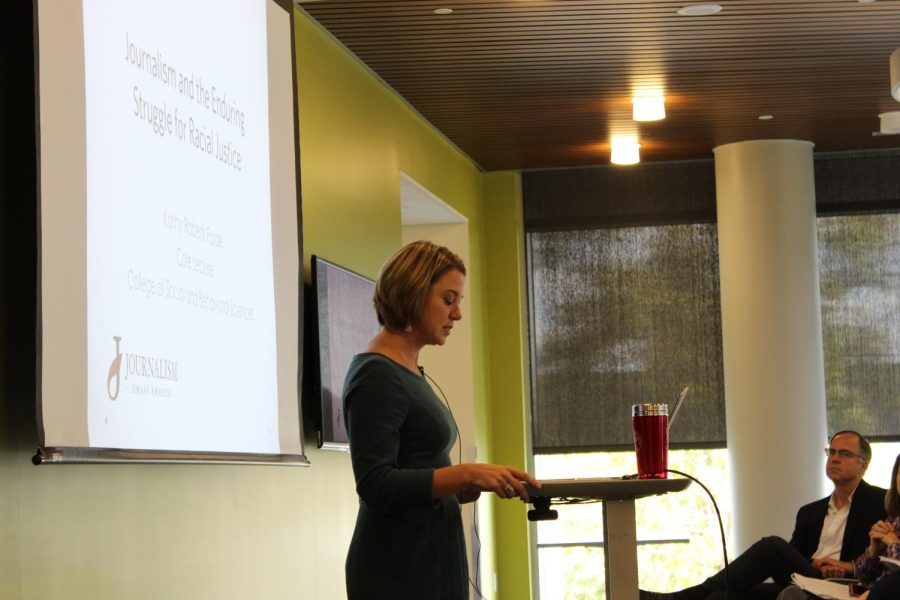On Nov. 3, the University of Massachusetts hosted a virtual conversation between Dr. Kathy Roberts Forde, a journalism professor and Dr. Traci Parker of the Afro-American Studies department.
The hour-long conversation centered around discussion of the book, “Journalism and Jim Crow: White Supremacy and the Black Struggle for a New America,” which Dr. Forde was the co-editor of. “Journalism and Jim Crow” is the “first extended work to document the critical role of the white press in building white supremacist political economies and social orders in the New South— and the critical role of the Black press in fiercely resisting — from the end of Reconstruction through the first decades of the twentieth century,” according to the book’s website.
The book was published in December of 2021 and is the recipient of the AEJMC History Division Book Award, the American Journalism Historians Association Book award and was a finalist for the AEJMC Tankard Book Award.
“Journalism and Jim Crow” features ten essays that bring to light the white press’ role in enforcing white supremacist systems, as well as how the Black press acted in resistance.
The event began with an introduction from Joya Misra, a professor at the UMass Department of Sociology. Misra seemed excited to introduce both Forde and Parker, who she said were “some of her favorite people on campus.”
Forde is an American journalism historian and is the Associate Dean of Equity & Inclusion in the UMass College of Social & Behavioral Sciences. In addition to “Journalism and Jim Crow,” Forde’s book, “Literary Journalism on Trial: Masson v. New Yorker and the First Amendment” was the recipient of the Frank Luther Mott-KTA book award and the AEJMC History Division book award.
Dr. Traci Parker is an Associate Professor of Afro-American Studies at UMass. She is the author of “Department Stores and the Black Freedom Movement: Workers, Consumers, and Civil Rights.” At UMass, Parker teaches courses on African American women’s history, nineteenth and twentieth century U.S. history, race and racism, class, labor, capitalism and consumer culture.
“This evening is an opportunity to reflect on key lessons of ‘Journalism and Jim Crow,’” Misra said.
Forde said that the inspiration behind writing “Journalism and Jim Crow” is her position as a historian of U.S. press.
“[It’s a] long story, but we found instances of [white] newspaper editors in the South involved in convict leasing… which was this neo-slavery in which a contravention in the 13th Amendment allowed people convicted of crimes to be re-enslaved, [and] leased out to private corporation,” Forde said.
“We did a study and found newspaper editors involved in this … case after case of white newspaper editors actively being political actors and economic actors in building white supremacy,” she added. “We thought, ‘this is a part of history that is poorly known.’”
The two professors connected the stories cited in the book to present-day civil rights issues.
“In the late 19th century, Black press was an amazing space in American intellectual socio political life, where Black Americans made sense of the world together … [it was] an incredible experiment in multiracial democracy building,” Forde said.
“When that ended and the nation turned away from [Reconstruction], the Black press was a space where Black Americans fought together and organized together … every member of the Black press was an activist,” she said.
Forde added that there is a Black press today, but “it’s been disaggregated.”
Parker said she observed the disconnect between modern Black stories that are told by white reporters. “When Black Lives Matter happened, I was always thinking about how the Chicago Defender would’ve reported [it]… having white journalists, it’s not as personal,” Parker said.
“[I want] to give credit to high profile Black journalists today,” Forde said. “After Trayvon Martin, you had a renaissance of extraordinary black journalists, doing hard work of ‘the race beat.’”
“Beyond those issues, we have black journalists leading the way for change in journalism… what might it look like to have a kind of journalism that serves liberal, multiracial democratic ends?” she added.
Forde and Parker said they look towards the future and next week’s election. Parker asked Forde, “Is there something you think voters should be critical of when it comes to consuming our news?”
“I expect most people listening to this conversation listen to and attend to a wide variety of fact based, reality-based news” Forde said. “I don’t have advice other than to do anything you can to support journalism [that is] connected to and committed to reality, facts and democracy and multiracial democratic values.”
“We need a news media with standards that’s built in a way that serves democratic ends…[we need to work together] across all kinds of difference so we can build a multiracial democracy.”
Mia Vittimberga can be reached at [email protected] and followed on Twitter @MiaVittimberga.


















